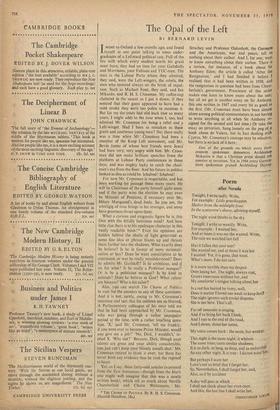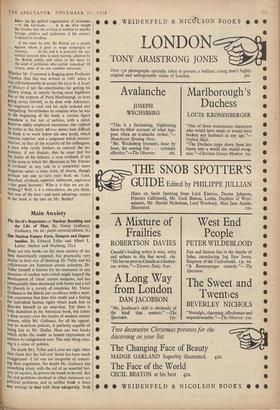The Opal of the Left
By BERNARD LEVIN IWENT to Oxford a few months ago, and found myself at one point talking to some under- graduates of a Leftward political cast. Full of the fire with which every student worth his grant must burn, they had no time for your Gaitskells and M orrisons, your Fabians and TUC-men. The men in the Labour Party whom they admired, they said, were the Left-wingers, the rebels, the men who teetered always on the brink of expul- sion. Such as Michael Foot, they said, and Ian Mikardo, and R. H. S. Crossman. My coffee-cup clattered in the saucer as I put it down; if they noticed that their guest appeared to have had a mild stroke they were too polite to mention it. But for me the years had slid-back (not so many years, I might add) to the time when I, too, had admired Mr. Crossman for being a rebel and a Left-winger. Had I been as mistaken as these grave and courteous young men? No; there really was a time when Mr. Crossinan had been a member of the Keep Left movement, and M r. Bevin (some of whose best friends were Jews)' had been very, very angry with hith. Mr. Cross- man did not make brilliant speeches from the platform at Labour Party conferences in those days, and was mighty lucky to catch the chair- man's eye from the floor. And his future in politics looked as dim as could be. Ichabod ! -Ichabod !
For now Mr. Crossman is respectable, and has been working his passage these many years. He will be Chairman of the party himself quite soon, and if the party wins the election he may even be Minister of Pensions, if necessary over Mr. Hilary Marq.uand's dead body. So you see, the whirligig of time brings in his revenges, and some have greatness thrust upon them.
What a curious and enigmatic figure he is, this Don with the fitfully luminous mind ! And how little clue there is to hls opalesque character in this. vastly readable book !* Even his opinions are hidden behind the shafts of light generated as some fine idea or phrase blazes up and thrusts them farther into the shadows. What exactly does he believe? Is he in favour of more nationali- sation or less? Does he Want conscription to be continued, or 'was he really misunderstood? Does he admire Mr. Gaifskell? Is he ambitious, and if so, for what? Is he really a Professor manque? Or is he a politician manqué? Is he kind to animals? Does he believe in God? What colour are hisveyes? Who is his tailor?
Alas, von .can search The Charm of Politics in vain for the 'answers to any of these questions. And it is not,, surely, owing to Mr. Crossman's reticence and tact that his outline§ are so blurred,. A Parliamentary colleague, of his once told me that he had been approached by Mi. Crossman, who was going through a rather Unpopular period at the time, with a rather touching ques- tion. 'X,' said Mr. Crossman, 'tell me frankly; if you were ever to become Prime Minister, would you give me a job?"No, Dick, I wouldn't,' re- plied X. 'Why not?"Because, Dick, though your talents' are great and your ability considerable, you just can't keep your bloody mouth shut.' Mr. Crossman retired to think it over; but there has never been any evidence that he took the reproof to heart.
Yet; as I say, these forty-odd articles (reprinted from the New Statesman—though from the blurb you might well imagine that this was. a newly written book), which tell us much about Neville Chamberlain and Chaim Weitzmann, Mr.
* THE CHARM OF POLITICS. By R. H. S. Crossman. (Hamish Hamilton, 18s.) Strachey and Professor Oakeshott, the Germans and the Americans, war and peace, tell us nothing about their author. And I, for one, want to know something about their author. There is a review, for instance, of a book about Sir Anthony Eden; the article is called 'After the Resignation,' and I had finished it before I realised that it had been written in 1938, and the resignation in question had been from Cham- berlain's government. Prescience of this order makes one keen to know more about the seer; but all we get is another essay on Sir Anthony, this one written in 1947 and every bit as good as the first. (Mr. Crossman must have been almost alone among political commentators in not having to write anything at all when Sir Anthony re- signed for the second and last time.) Or take the essay on terrorism, hung, loosely on the peg of, 3 book about de Valera, but in fact dealing with Cyprus. Mr. Crossman's courage may be selective, but there is no lack of it here : One of the grounds on which every Gov- ernment spokesman .denounces ArchbishoP Makprios is that a Christian priest should not connive at terrorism. Yet in 1944 every Govern- ment spokesman praised Archbishop Thaws-
kinos for his gallant organisation of resistance —to the Germans. . . . It is we who taught the Greeks that the civilian is entitled to murder foreign soldiers and policemen if his country is denied its freedom.
If the truth be told, the British arc a people against whom it pays to wage campaigns of violence. . . . In the end it is precisely the suc- cessful terrorist who is most warmly admired by the British public and taken to his heart by the kind of politician who earlier remarked '01 course, none of us can condone terrorism.'
Whether M r. Crossman is flogging poor Professor roynbee (but this was written in 1947, when it was still fashionable to accept the facts in A Study )f History if not the conclusions) for getting his history wrong, or merely having some highbrow !tin at the expense of Putzi Hanfstaengl, or even Wing astray himself, as he does with Adenauer, us argument is cool and his style ordered and =ompelling. Nevertheless he remains what he was it the beginning of the book, a curious figure somehow in but not of politics, with a mind. to-wever oddly employed sometimes (the rubbish 1e 'writes in the Daily Mirror shows how difficult )e finds it to work below his own level), which 'emains superior, and a judgment which remains nterior, to that of the majority of his colleagues; k • man who rarely bothers to conceal the im- )atience, if not disdain, that he must feel for l'te duller of his fellows; a 'man civilised, if not ti the sense in which Mr. Berenson or Mr. Forster s 'civilised, at any rate in a somewhat more kogustan sense; a man, even, of charm, though )erhaps not one to turn your back on. Cool, letached, civilised, superior, indiscreet, equivocal —but good heavens! Who is it that we are de- cribing? Well, is it a coincidence, do you think, hat one of the best—and most admiringessays ri the book is the one on Mr. Butler?















































































 Previous page
Previous page